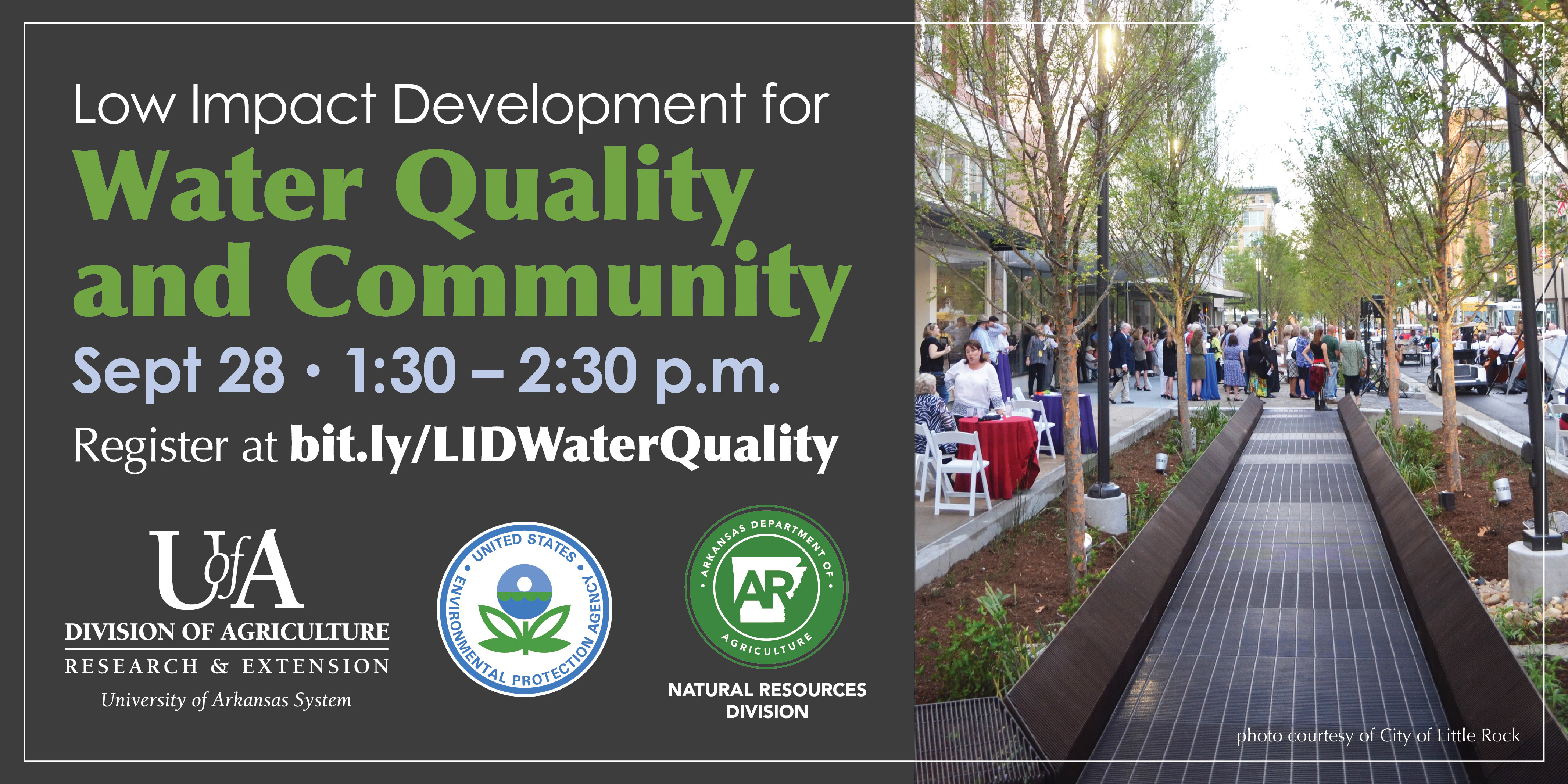Sept. 20, 2021
Cooperative Extension Service providing webinar to explain low-impact development approach
By Ryan McGeeney
U of A System Division of Agriculture
Fast Facts:
- Low-impact development designed to help cities better manage stormwater runoff as they grow
- Program is grant-funded through the EPA and Arkansas Natural Resources Division
(320 words)
LITTLE ROCK — As cities, towns and other metropolitan areas in Arkansas continue to grow, the University of Arkansas System Division of Agriculture is working to help developers and planners keep water quality in mind.
The Cooperative Extension Service, part of the Division of Agriculture, will produce a free webinar focused on low-impact development for water quality and communities. The webinar is scheduled to stream Sept. 28, 1:30-2:30 p.m., CDT.
The program is funded by a grant from the U.S. Environmental Protection Agency and the Arkansas Natural Resources Division, part of the Arkansas Department of Agriculture. The grant is aimed and expanding green infrastructure.
John Pennington, extension water quality educator for the Division of Agriculture, said low-impact development is key to both maintaining natural resources and making structures as durable as possible as cities continue to grow.
“Low-impact development, or LID, is a building and development technique that is used to slow down, spread out, and soak in stormwater on site,” Pennington said. “The technique attempts to maintain pre-development water movement patterns in post-development conditions.”
According to the EPA, the mid-20th century approach to stormwater management — the channeling of stormwater using engineered systems of curbs, gutters, pipes and so on — has resulted in significant damage to water quality.
“Damage to public and personal property associated with flooding is also an all-too-common outcome,” Pennington said.
“Incorporating LID into communities can reduce the amount of stormwater leaving an area, slow it down, prevent flooding and protect the quality of water in receiving streams,” he said. “This webinar will help citizens, municipal staff and decision-makers better understand the benefits of using LID in their communities, and how to modify city codes to allow or encourage LID in their community.”
The webinar will also provide local examples of LID applications located in communities throughout the state of Arkansas.
To learn about extension programs in Arkansas, contact your local Cooperative Extension Service agent or visit www.uaex.uada.edu. Follow us on Twitter and Instagram at @AR_Extension. To learn more about Division of Agriculture research, visit the Arkansas Agricultural Experiment Station website: https://aaes.uark.edu. Follow on Twitter at @ArkAgResearch. To learn more about the Division of Agriculture, visit https://uada.edu/. Follow us on Twitter at @AgInArk.
About the Division of Agriculture
The University of Arkansas System Division of Agriculture’s mission is to strengthen agriculture, communities, and families by connecting trusted research to the adoption of best practices. Through the Agricultural Experiment Station and the Cooperative Extension Service, the Division of Agriculture conducts research and extension work within the nation’s historic land grant education system.
The Division of Agriculture is one of 20 entities within the University of Arkansas System. It has offices in all 75 counties in Arkansas and faculty on five system campuses.
Pursuant to 7 CFR § 15.3, the University of Arkansas System Division of Agriculture offers all its Extension and Research programs and services (including employment) without regard to race, color, sex, national origin, religion, age, disability, marital or veteran status, genetic information, sexual preference, pregnancy or any other legally protected status, and is an equal opportunity institution.
# # #
Media contact:
Ryan McGeeney
Communications Services
University of Arkansas System Division of Agriculture
Cooperative Extension Service
(501) 671-2120
rmcgeeney@uada.edu
